
Updated Swift Solutions for Auditory Clarity Banishing Buildup Noise

Swift Solutions for Auditory Clarity: Banishing Buildup Noise
It will be challenging to remove static noise from audio since the language is often muddled by ambient noise, such as the dreaded whirring of an air conditioning unit or fans. This can make it challenging to get good audio. It is common practice to eliminate background noise before recording and mixing sound effects or working on other areas of the video’s design.
You are lucky since the Internet allows you to choose a few strategies for removing noise from audio. You may lessen the amount of noise in your video or audio recording by including some background music or by utilizing software that edits audio or video. This article will significantly assist you in searching for a method to remove static sound from audio, so keep that in mind as you read it. Let’s get started!

Part 1: How to Remove Static Noise from Audio Files with Only & Free tools?
Consider shaky or unclear video to be a problem. Audio noise may damage your video just as fast as poor visual quality. It may be tricky to remove static sound from audio, however. Additionally, it might be difficult to capture clear audio, particularly in busy areas. There are occasions when you get hissy or otherwise noisy audio, whether because of background noise or less-than-ideal equipment.
1. Audiodenoise
The tool lets you change many things, like the time smoothing of the noise reduction filter, the noise model based on tracking noise modulation, the size of the analysis blocks, etc. So, how do you remove the static audio in the background?
Here are the steps to take.
How to use Audio Denoise to get rid of static noise
Step1 Click on the “Choose File” option to start. You can also choose the video from the list of “Demo files.”
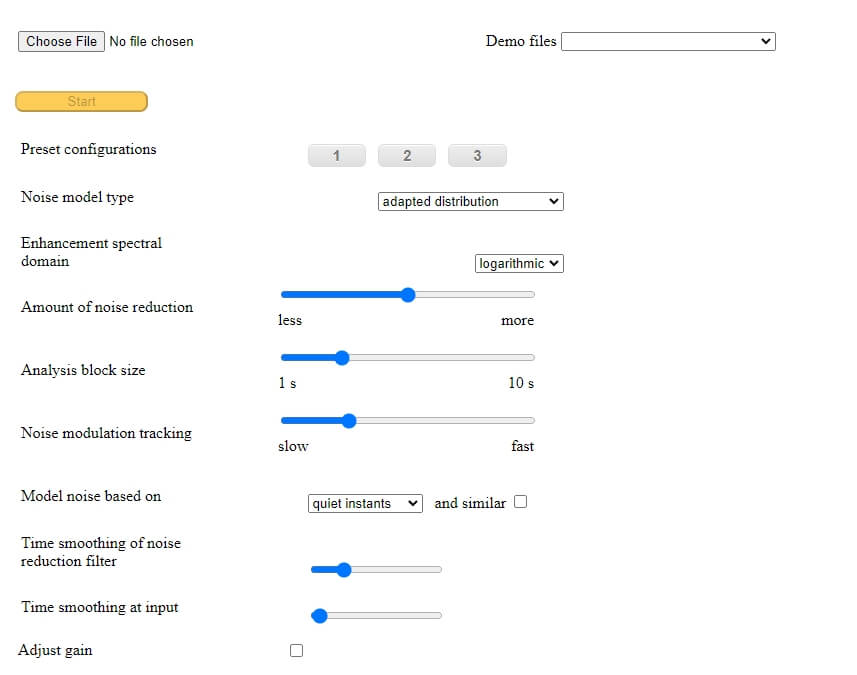
Step2 Press the Process button after you’ve uploaded the file to eliminate the noise in the audio.
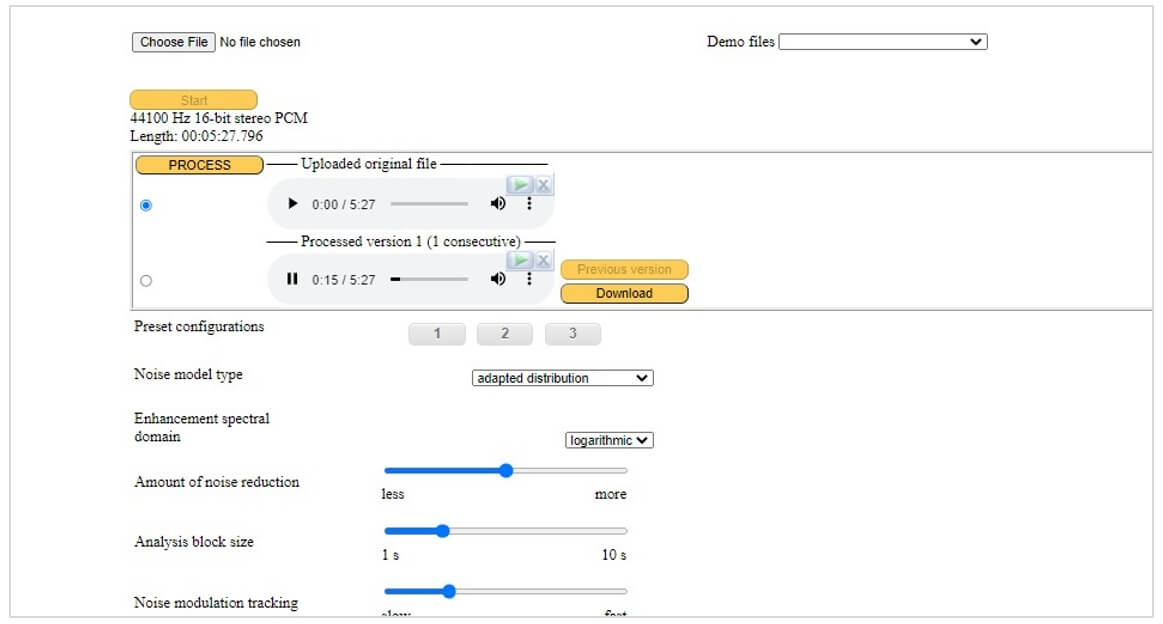
Step3 After the audio is done being processed, click the Download button to save your video to your PC.
2. Wondershare AILab
You may remove static from audio by using Wondershare AILab. There is no need to specify any settings since the AI will identify and eliminate noise on its own automatically. To improve audio quality, use a noise reduction technique based on AI. No more noise will be from the breeze, the crowd, or another unwelcome sound. AILab gives you access to various free online tools that make creating images, sounds, and videos simpler and more enjoyable.
How to use Wondershare AILab to remove static sound from audio
Step1 First, choose or drag your audio file to start uploading it.

Step2 The AI will analyze the file automatically and eliminate the static sound.

Step3 Finally, at this moment, download the revised audio file.
3. Veed.io
With VEED, you can simultaneously record your computer screen and camera, making it simple to produce instructional films for professional or personal use.
VEED is one of the most straightforward online video editors that can remove static from audio with just one click of the mouse, making it an excellent choice for people who are just starting. You don’t need to re-record your audio or purchase expensive microphones that block sound. It can help you eliminate background noise from MP3, WMA, and other audio files, but with a watermark.
How do I remove static sound from the audio file using Veed online?
Step1 To upload your audio file, click the “Choose Audio” button to upload your audio file.

Step2 Click on the audio track to open the Settings menu, then choose “Clean Audio” from the list of options. The background noise will vanish on its own in a few seconds.
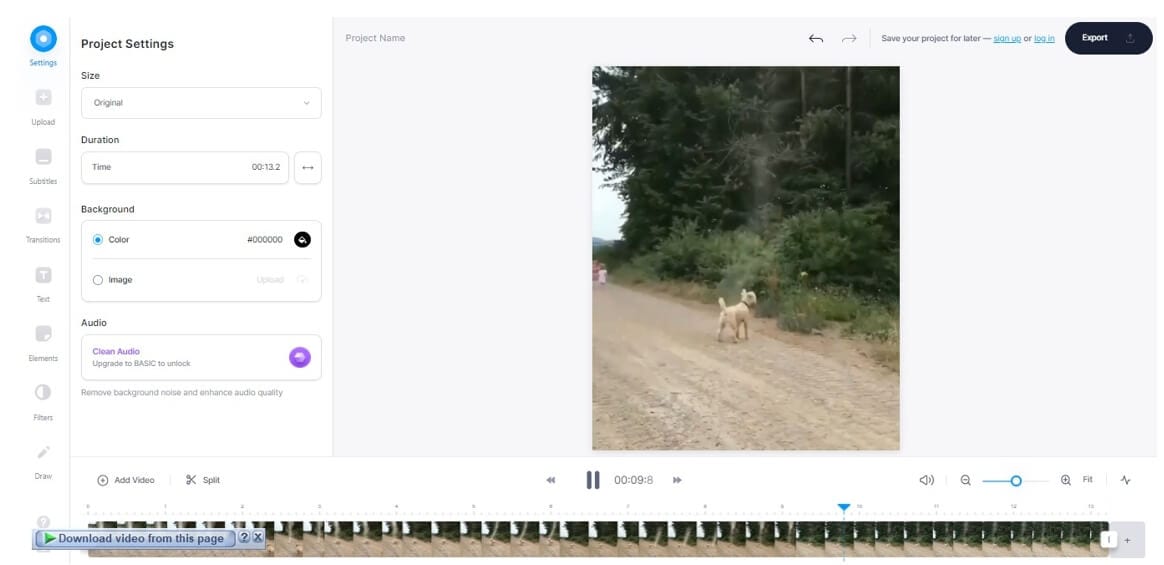
Step3 That’s it; you’re done. When you click “Export,” you will make your new file in a few seconds.
Part 2: How to improve your audio in the best way?
Wondershare is the company that has produced the Filmora family of video production and editing apps. Filmora offers software that may be used by various skill levels, from novice to intermediate. A timeline, a preview window, and an effects library are some of the standard elements of Filmora. These features are accessed and controlled by a drag-and-drop user interface.
Free Download For Win 7 or later(64-bit)
Free Download For macOS 10.14 or later
The Filmora software collection may run on machines running either Windows or macOS operating systems. It is possible to get free product samples to test them out before buying them. On the official Filmora website, you can see pricing choices for each program.
The Filmora Video Editor is easy to use and delivers various features superior to those provided by other video editors. Because of this, it is considered one of the best audio editors to answer how to remove static from audio and video.
Here is how to remove static noise from audio with Filmora.
Step1 Upload Files
Open Wondershare Filmora and load your video into the timeline window. You can get a video preview, cut it up, and remove the bits you don’t want to preserve.
Step2 Edit Audio
Select “Edit Audio” by using the context menu after right-clicking the movie in the timeline. You will see four options: silence detection, modify audio, disconnect audio, and mute. Choose the “Audio” option from the drop-down menu if you want to separate the audio from the video.
Step3 Remove Background Static
Double-click on the audio track to eliminate the background noise directly, and pick “normal denoise” from the Edit Panel. You may also double-click the video clip in the timeline to reach the Editing panel without first separating the audio from the video. Once there, you can edit the audio and eliminate the noise by clicking on the Audio tab in the Editing panel.
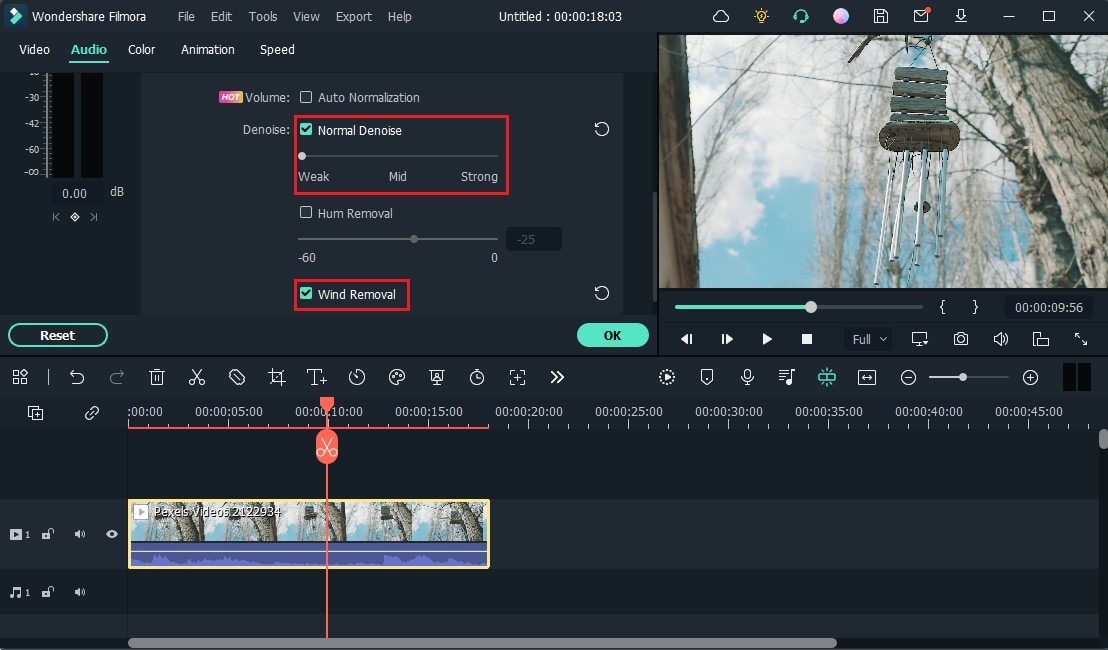
Step4 Fine Tune and Export
Lastly, with Equalizer, fine-tune the sound to make it more natural. For a better effect, adjust the audio frame by frame until it fits perfectly with the video. After the result, you can click “Export” to save the less noisy video on your PC or directly post it to YouTube or Vimeo.
Part 3: How to Record Noise-Free Audio?
So, that was how to remove static sound from audio. But what if you record noise-free audio instead?
If you record with a microphone and continue to hear static noise, the problem most likely lies in the cable. Most microphone cables consist of one or two conductors (wires) braided together inside a metal. This is the function that protection fulfills. It prevents the hum or static created by signals coming from outside from interfering with the signal flowing via the internal conductors.
If one of the shield connections at either end of the wire is only sometimes present or isn’t there, this might produce static electricity. If you can access the connection, check that all cables and shields are connected safely and securely.
Near a stable electromagnetic source is another possible explanation for static, which may be industrial motors or high-power radio transmitters.
Another characteristic of microphones is their impedance. It would be best to use microphone with the same impedance as the recording device.
One last step is to test the static using a different microphone to determine whether the problem persists. If this is the case, the recording device can be the source of the issue.
Conclusion
Do you believe that a grainy or unsteady video is a problem? Video quality is vital, but audio noise can quickly damage your film. However, removing static sound from audio may be a pain in the neck. In addition, capturing clear audio may be challenging, particularly in areas with a lot of background noise.
Now you have an audio file with less or no noise and want to learn how to remove static noise from audio. With the above suggestions, I hope you’ll find eliminating background noise from the video easy. If you want to be more creative in removing static noise from audio, try the Filmora video editor to give your mind a boost.
Free Download For macOS 10.14 or later
The Filmora software collection may run on machines running either Windows or macOS operating systems. It is possible to get free product samples to test them out before buying them. On the official Filmora website, you can see pricing choices for each program.
The Filmora Video Editor is easy to use and delivers various features superior to those provided by other video editors. Because of this, it is considered one of the best audio editors to answer how to remove static from audio and video.
Here is how to remove static noise from audio with Filmora.
Step1 Upload Files
Open Wondershare Filmora and load your video into the timeline window. You can get a video preview, cut it up, and remove the bits you don’t want to preserve.
Step2 Edit Audio
Select “Edit Audio” by using the context menu after right-clicking the movie in the timeline. You will see four options: silence detection, modify audio, disconnect audio, and mute. Choose the “Audio” option from the drop-down menu if you want to separate the audio from the video.
Step3 Remove Background Static
Double-click on the audio track to eliminate the background noise directly, and pick “normal denoise” from the Edit Panel. You may also double-click the video clip in the timeline to reach the Editing panel without first separating the audio from the video. Once there, you can edit the audio and eliminate the noise by clicking on the Audio tab in the Editing panel.

Step4 Fine Tune and Export
Lastly, with Equalizer, fine-tune the sound to make it more natural. For a better effect, adjust the audio frame by frame until it fits perfectly with the video. After the result, you can click “Export” to save the less noisy video on your PC or directly post it to YouTube or Vimeo.
Part 3: How to Record Noise-Free Audio?
So, that was how to remove static sound from audio. But what if you record noise-free audio instead?
If you record with a microphone and continue to hear static noise, the problem most likely lies in the cable. Most microphone cables consist of one or two conductors (wires) braided together inside a metal. This is the function that protection fulfills. It prevents the hum or static created by signals coming from outside from interfering with the signal flowing via the internal conductors.
If one of the shield connections at either end of the wire is only sometimes present or isn’t there, this might produce static electricity. If you can access the connection, check that all cables and shields are connected safely and securely.
Near a stable electromagnetic source is another possible explanation for static, which may be industrial motors or high-power radio transmitters.
Another characteristic of microphones is their impedance. It would be best to use microphone with the same impedance as the recording device.
One last step is to test the static using a different microphone to determine whether the problem persists. If this is the case, the recording device can be the source of the issue.
Conclusion
Do you believe that a grainy or unsteady video is a problem? Video quality is vital, but audio noise can quickly damage your film. However, removing static sound from audio may be a pain in the neck. In addition, capturing clear audio may be challenging, particularly in areas with a lot of background noise.
Now you have an audio file with less or no noise and want to learn how to remove static noise from audio. With the above suggestions, I hope you’ll find eliminating background noise from the video easy. If you want to be more creative in removing static noise from audio, try the Filmora video editor to give your mind a boost.
“Audio Chop & Split in a Flash: Speeding up MP3 Separation Processes”
You often come across audio files that we like and enjoy. An uncertain situation usually occurs when you love a small part of the audio, but the complete audio is not per your level. If you encounter any such situation, what will you do? Spend hours to find another audio? Or suffice with what you have got?
What if we give you a third option. How about splitting the audio into smaller parts? Well, this sounds a lot better than the other options. The only thing you need is a good Audio Splitter for doing this. You don’t even have to worry about this because we are about to guide you on how to split audio files. We will share an MP3 splitter online and the steps for both Windows and Mac.
In this article
01 How to Split Audio Files on Windows and Mac?
02 How to Split Audio/MP3 File Online?
Part 1. How to Split Audio Files on Windows and Mac?
Whenever you think about audio editing, Wondershare Filmora is associated with that as the best software. The audio editor is perfect and compatible with both Windows and Mac. Wondershare Filmora never ceases to impress its users with its stunning features.
The audio editor Filmora offers a wide range of features. You can add your favorite background music to your videos and change your ordinary video. Moreover, features like trimming, cutting, adjusting audio are also available.
Wondershare Filmora also offers professional editing features such as its Audio Equalizer EQ, Audio Mixer, and also Audio Denoise feature. An exciting thing about Filmora audio editor is its Detach Audio feature. With this, you can Detach Audio from a video.
For Win 7 or later (64-bit)
For macOS 10.12 or later
Another handy feature that you get from Filmora is Audio Splitter. With this, users can split audio files and extract the part that they like while deleting the other part. If you want to learn about splitting audio files on Windows and Mac with Filmora, then follow the steps below.
Step 1: Creating Project
To split audio files, you firstly need to open Wondershare Filmora on your respective device. Then, you need to create a new project so that you can get started. The next step demands you to import the audio file to Filmora.
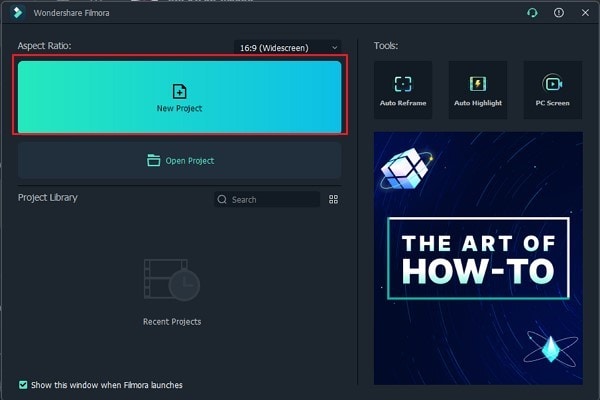
Step 2: Importing Audio File
This could be done by moving to the ‘File’ tab from the top panel. A menu will appear on the screen from which you should select ‘Import Files.’ Then a popup menu will show up, simply hit the ‘Import Media Files’ option.
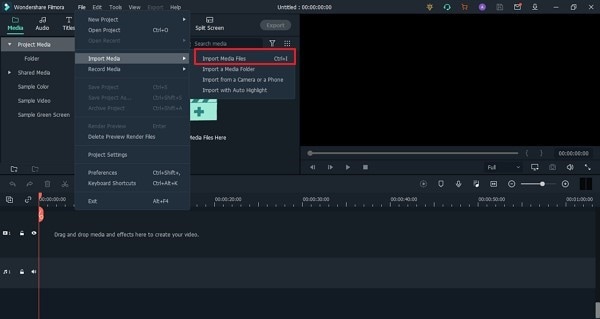
Step 3: Drag onto Timeline
You can locate the file from your respective device and import it to Filmora. Once the file has been imported successfully, you now have to drag and drop it onto the timeline to start splitting it.
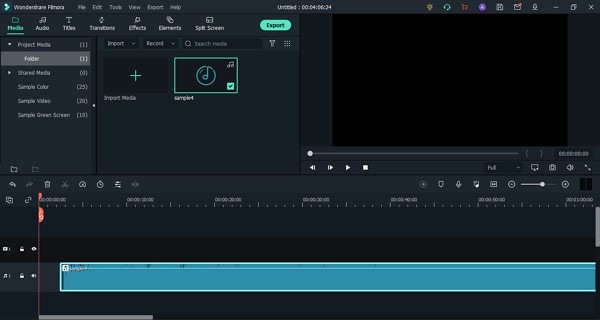
Step 4: Split Audio
Now comes the fun part. Once the audio file is on the timeline, you will see a play head. You need to drag the play head to the point where you want to split the audio. You will see a scissor option after dragging the play head; hit that to split audio into two parts.
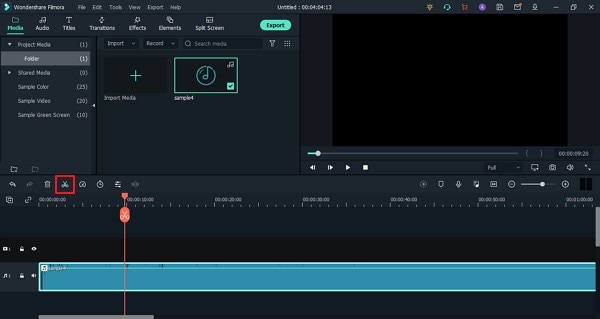
Step 5: Edit the Separated Audio
You can delete the audio that you don’t want by selecting it and pressing the ‘Delete’ button on the keyboard. In comparison, you can edit the other part of the audio. For this, double click on the audio in the timeline to open Audio Editing Window.
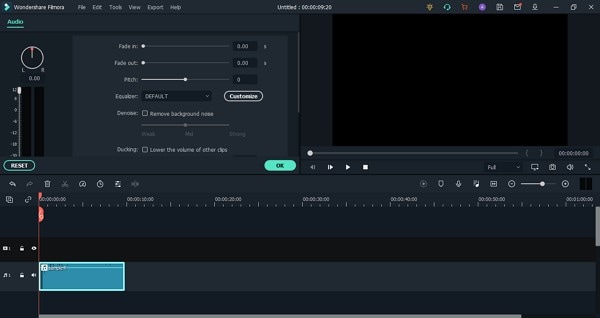
Step 6: Exporting File
Once you have edited the file and are satisfied, it is ready to be exported. For this, hit the ‘Export’ button, select the output format and save it on your device.

Split Audio after Detaching from Video
As we have mentioned, sometimes you like a sound, but it is part of a video. Do you know a way to get that audio from a video? Well, yes, with Filmora, you can get your favorite audio even from videos and then split it.
This could be done by using its ‘Detach Audio from Video’ feature. What this feature does is that it separates the audio from video and displays both the files separately on the timeline. You can delete the video file by selecting it and pressing ‘Delete.’ Whereas, by following the above-mentioned steps, you can then split the audio easily with the Filmora MP3 splitter.
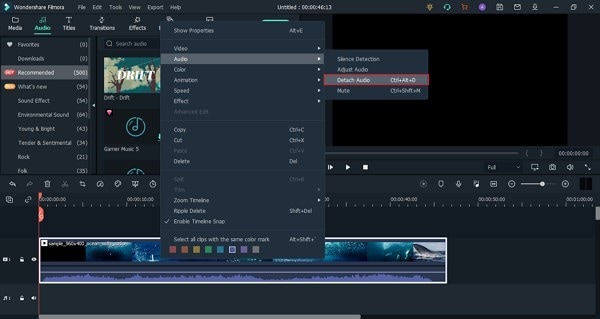
Final Words
To learn about splitting audio, nothing is better than this article. We have discussed in detail about MP3 splitter online. Also, we talked about Wondershare Filmora audio splitter, the best option for all Windows and Mac users.
Wondershare Filmora
Get started easily with Filmora’s powerful performance, intuitive interface, and countless effects!
Try It Free Try It Free Try It Free Learn More >

02 How to Split Audio/MP3 File Online?
Part 1. How to Split Audio Files on Windows and Mac?
Whenever you think about audio editing, Wondershare Filmora is associated with that as the best software. The audio editor is perfect and compatible with both Windows and Mac. Wondershare Filmora never ceases to impress its users with its stunning features.
The audio editor Filmora offers a wide range of features. You can add your favorite background music to your videos and change your ordinary video. Moreover, features like trimming, cutting, adjusting audio are also available.
Wondershare Filmora also offers professional editing features such as its Audio Equalizer EQ, Audio Mixer, and also Audio Denoise feature. An exciting thing about Filmora audio editor is its Detach Audio feature. With this, you can Detach Audio from a video.
For Win 7 or later (64-bit)
For macOS 10.12 or later
Another handy feature that you get from Filmora is Audio Splitter. With this, users can split audio files and extract the part that they like while deleting the other part. If you want to learn about splitting audio files on Windows and Mac with Filmora, then follow the steps below.
Step 1: Creating Project
To split audio files, you firstly need to open Wondershare Filmora on your respective device. Then, you need to create a new project so that you can get started. The next step demands you to import the audio file to Filmora.

Step 2: Importing Audio File
This could be done by moving to the ‘File’ tab from the top panel. A menu will appear on the screen from which you should select ‘Import Files.’ Then a popup menu will show up, simply hit the ‘Import Media Files’ option.

Step 3: Drag onto Timeline
You can locate the file from your respective device and import it to Filmora. Once the file has been imported successfully, you now have to drag and drop it onto the timeline to start splitting it.

Step 4: Split Audio
Now comes the fun part. Once the audio file is on the timeline, you will see a play head. You need to drag the play head to the point where you want to split the audio. You will see a scissor option after dragging the play head; hit that to split audio into two parts.

Step 5: Edit the Separated Audio
You can delete the audio that you don’t want by selecting it and pressing the ‘Delete’ button on the keyboard. In comparison, you can edit the other part of the audio. For this, double click on the audio in the timeline to open Audio Editing Window.

Step 6: Exporting File
Once you have edited the file and are satisfied, it is ready to be exported. For this, hit the ‘Export’ button, select the output format and save it on your device.

Split Audio after Detaching from Video
As we have mentioned, sometimes you like a sound, but it is part of a video. Do you know a way to get that audio from a video? Well, yes, with Filmora, you can get your favorite audio even from videos and then split it.
This could be done by using its ‘Detach Audio from Video’ feature. What this feature does is that it separates the audio from video and displays both the files separately on the timeline. You can delete the video file by selecting it and pressing ‘Delete.’ Whereas, by following the above-mentioned steps, you can then split the audio easily with the Filmora MP3 splitter.

Final Words
To learn about splitting audio, nothing is better than this article. We have discussed in detail about MP3 splitter online. Also, we talked about Wondershare Filmora audio splitter, the best option for all Windows and Mac users.
Wondershare Filmora
Get started easily with Filmora’s powerful performance, intuitive interface, and countless effects!
Try It Free Try It Free Try It Free Learn More >

02 How to Split Audio/MP3 File Online?
Part 1. How to Split Audio Files on Windows and Mac?
Whenever you think about audio editing, Wondershare Filmora is associated with that as the best software. The audio editor is perfect and compatible with both Windows and Mac. Wondershare Filmora never ceases to impress its users with its stunning features.
The audio editor Filmora offers a wide range of features. You can add your favorite background music to your videos and change your ordinary video. Moreover, features like trimming, cutting, adjusting audio are also available.
Wondershare Filmora also offers professional editing features such as its Audio Equalizer EQ, Audio Mixer, and also Audio Denoise feature. An exciting thing about Filmora audio editor is its Detach Audio feature. With this, you can Detach Audio from a video.
For Win 7 or later (64-bit)
For macOS 10.12 or later
Another handy feature that you get from Filmora is Audio Splitter. With this, users can split audio files and extract the part that they like while deleting the other part. If you want to learn about splitting audio files on Windows and Mac with Filmora, then follow the steps below.
Step 1: Creating Project
To split audio files, you firstly need to open Wondershare Filmora on your respective device. Then, you need to create a new project so that you can get started. The next step demands you to import the audio file to Filmora.

Step 2: Importing Audio File
This could be done by moving to the ‘File’ tab from the top panel. A menu will appear on the screen from which you should select ‘Import Files.’ Then a popup menu will show up, simply hit the ‘Import Media Files’ option.

Step 3: Drag onto Timeline
You can locate the file from your respective device and import it to Filmora. Once the file has been imported successfully, you now have to drag and drop it onto the timeline to start splitting it.

Step 4: Split Audio
Now comes the fun part. Once the audio file is on the timeline, you will see a play head. You need to drag the play head to the point where you want to split the audio. You will see a scissor option after dragging the play head; hit that to split audio into two parts.

Step 5: Edit the Separated Audio
You can delete the audio that you don’t want by selecting it and pressing the ‘Delete’ button on the keyboard. In comparison, you can edit the other part of the audio. For this, double click on the audio in the timeline to open Audio Editing Window.

Step 6: Exporting File
Once you have edited the file and are satisfied, it is ready to be exported. For this, hit the ‘Export’ button, select the output format and save it on your device.

Split Audio after Detaching from Video
As we have mentioned, sometimes you like a sound, but it is part of a video. Do you know a way to get that audio from a video? Well, yes, with Filmora, you can get your favorite audio even from videos and then split it.
This could be done by using its ‘Detach Audio from Video’ feature. What this feature does is that it separates the audio from video and displays both the files separately on the timeline. You can delete the video file by selecting it and pressing ‘Delete.’ Whereas, by following the above-mentioned steps, you can then split the audio easily with the Filmora MP3 splitter.

Final Words
To learn about splitting audio, nothing is better than this article. We have discussed in detail about MP3 splitter online. Also, we talked about Wondershare Filmora audio splitter, the best option for all Windows and Mac users.
Wondershare Filmora
Get started easily with Filmora’s powerful performance, intuitive interface, and countless effects!
Try It Free Try It Free Try It Free Learn More >

02 How to Split Audio/MP3 File Online?
Part 1. How to Split Audio Files on Windows and Mac?
Whenever you think about audio editing, Wondershare Filmora is associated with that as the best software. The audio editor is perfect and compatible with both Windows and Mac. Wondershare Filmora never ceases to impress its users with its stunning features.
The audio editor Filmora offers a wide range of features. You can add your favorite background music to your videos and change your ordinary video. Moreover, features like trimming, cutting, adjusting audio are also available.
Wondershare Filmora also offers professional editing features such as its Audio Equalizer EQ, Audio Mixer, and also Audio Denoise feature. An exciting thing about Filmora audio editor is its Detach Audio feature. With this, you can Detach Audio from a video.
For Win 7 or later (64-bit)
For macOS 10.12 or later
Another handy feature that you get from Filmora is Audio Splitter. With this, users can split audio files and extract the part that they like while deleting the other part. If you want to learn about splitting audio files on Windows and Mac with Filmora, then follow the steps below.
Step 1: Creating Project
To split audio files, you firstly need to open Wondershare Filmora on your respective device. Then, you need to create a new project so that you can get started. The next step demands you to import the audio file to Filmora.

Step 2: Importing Audio File
This could be done by moving to the ‘File’ tab from the top panel. A menu will appear on the screen from which you should select ‘Import Files.’ Then a popup menu will show up, simply hit the ‘Import Media Files’ option.

Step 3: Drag onto Timeline
You can locate the file from your respective device and import it to Filmora. Once the file has been imported successfully, you now have to drag and drop it onto the timeline to start splitting it.

Step 4: Split Audio
Now comes the fun part. Once the audio file is on the timeline, you will see a play head. You need to drag the play head to the point where you want to split the audio. You will see a scissor option after dragging the play head; hit that to split audio into two parts.

Step 5: Edit the Separated Audio
You can delete the audio that you don’t want by selecting it and pressing the ‘Delete’ button on the keyboard. In comparison, you can edit the other part of the audio. For this, double click on the audio in the timeline to open Audio Editing Window.

Step 6: Exporting File
Once you have edited the file and are satisfied, it is ready to be exported. For this, hit the ‘Export’ button, select the output format and save it on your device.

Split Audio after Detaching from Video
As we have mentioned, sometimes you like a sound, but it is part of a video. Do you know a way to get that audio from a video? Well, yes, with Filmora, you can get your favorite audio even from videos and then split it.
This could be done by using its ‘Detach Audio from Video’ feature. What this feature does is that it separates the audio from video and displays both the files separately on the timeline. You can delete the video file by selecting it and pressing ‘Delete.’ Whereas, by following the above-mentioned steps, you can then split the audio easily with the Filmora MP3 splitter.

Final Words
To learn about splitting audio, nothing is better than this article. We have discussed in detail about MP3 splitter online. Also, we talked about Wondershare Filmora audio splitter, the best option for all Windows and Mac users.
Wondershare Filmora
Get started easily with Filmora’s powerful performance, intuitive interface, and countless effects!
Try It Free Try It Free Try It Free Learn More >

“Windows Enthusiasts’ Guide to Premium Free Audio Editing Applications “
Audios are as crucial a part of our lives as any other media communication tool. To get the most out of your audio, you can use the help of a suitable open-source audio editor. The best part about open-source sound editor software is its freely available source codes. Thus, you can study and change them yourself to enhance accessibility.
Want the perfect tool for your audio editing needs? Look no further. Here, you can find the 6 best open-source audio editing tools to make your audio files stand out. Learn more about these audio editors and what you can achieve with them below. Let’s get started with the tools!
Part 1: 5 Best Free Open-Source Audio Editor for Windows User
Looking for the perfect tool to edit your audio file? Here are some top-list open-source audio editing software you can use to enhance your audio files. These tools come with a variety of functions that can help your audio files stand out. Let’s get started! You won’t be disappointed!
1. Audacity
Audacity is one of the best open-source audio editor currently available in the market. Available for Windows 7 and later versions, Audacity is also supported by Mac and Linux. The software comes with a variety of easy-to-use features. This makes the editing process considerably stress-free for beginners. It surely is the deal.
Audacity is a remarkable audio editor. It allows you to perform all the basic editing functions on your audio. These include recording, editing, trimming, and splitting files. Additionally, the tool also provides some top-tier audio effects. Resultantly, you can analyze your audio file in depth. Are you impressed with it?
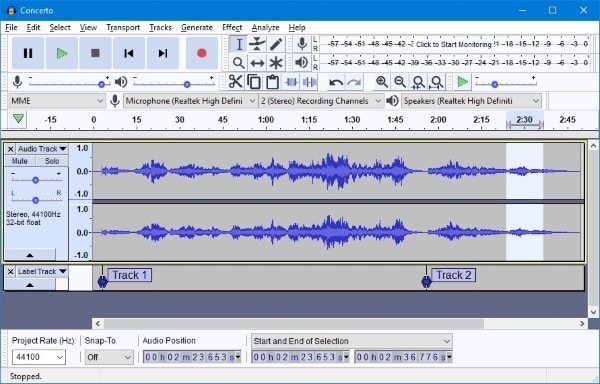
Key Features
- Introduce various types of noise and other sound effects to your audios.
- Preview and quick-play your audio clips easily.
- Merge or align tracks to the position of your choice.
- A range of supported formats includes MP3, WMA, WAV, AC3, OGG, and more.
- Simple keyboard shortcuts to make things easier.
2. WaveShop
WaveShop is yet another excellent open-source sound editor that can get the job done. It is a free and simple audio editor that is perfect for Windows users. WaveShop also comes in portable packages to suit your various needs. Do you wish to know more about it?
WaveShop offers many useful features for audio editing. You can import your audio files into the program’s interface and can then apply a range of functions. From trimming to amplifying and reversing audios, WaveShop lets you do it all. Go through its features to know more about it.
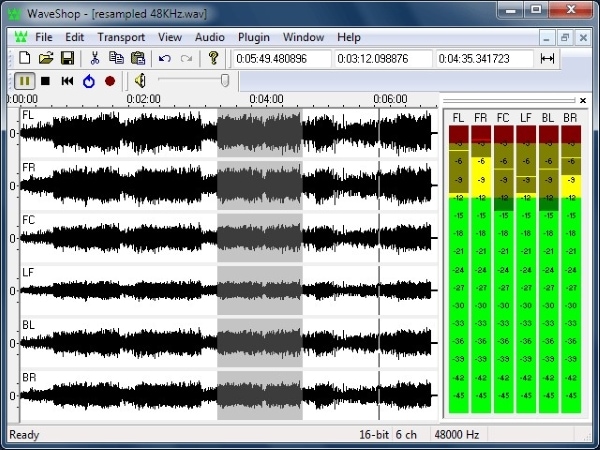
Key Features
- A multi-tab interface that enables you to edit different soundtracks in different windows.
- A timeline to easily delete, insert, or edit audio tracks.
- Audio effects and filters such as fade, reverse, amplify, etc.
- Save your output file in several formats such as RAW, WAV, AVR, FLAC, etc.
- A range of customization options like changing the sample size and waveform etc.
3. SoundEditor
The next open-source audio editor on our list is SoundEditor. Like other audio editors, SoundEditor comes with a range of editing options. These include cut/copy functions and recording soundtracks. The editor can also support multiple file editing in as many windows as you want. Isn’t it great?
Although SoundEditor comes with a full set of editing tools, it only supports WAV file formats. Still, the software is a good choice with its thorough toolset and easy-to-use functions. You can look across the key features to be sure about your selection.
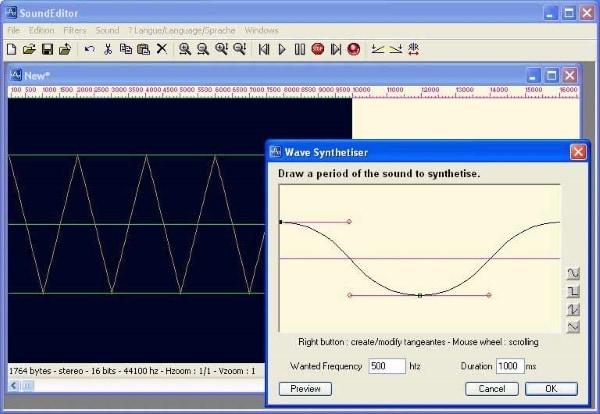
Key Features
- A built-in sound recorder in the software.
- Options to insert silence at specified lengths in the audio.
- Change the playback speed of the entire track or specific sections.
- Wave synthesizer and resampler options for audio files.
- A multiple documents interface to let you open many windows at once.
4. Ardour
Another splendid open-source sound editor specifically meant for Windows users is Ardour. Musicians, audio engineers, soundtrack editors, and composers worldwide trust Ardour. Ardour offers a set of comprehensive audio editing tools which can be used to make your audios shine. This is truly phenomenal!
Despite its unique features, Ardour is still pretty easy to use. Anyone with a basic idea about editing can use it to create audio masterpieces. From multichannel tracks to mixing and panning, Ardour has it all. Look across these features to know why it is among the best!
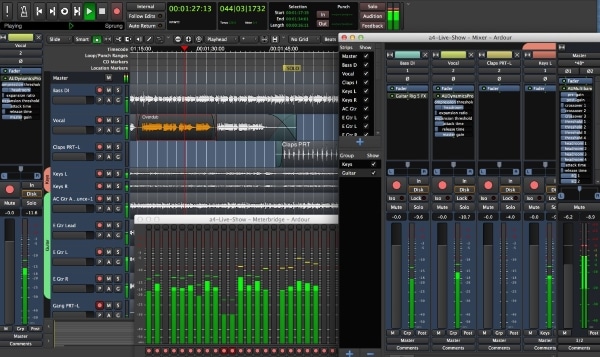
Key Features
- No limit to the number of tracks that can be edited simultaneously.
- Multichannel file export to save output files in different formats and sample rates.
- Flexible recording style without any setup requirement.
- Import videos and extract audio from them.
- Multiple routing and panning options along with sample-accurate automation.
5. Jokosher
Looking for a beginner-friendly tool? The answer lies in Jokosher. Jokosher is a simple and easy open-source audio editing software. As opposed to other complicated editors, Jokosher offers a plain and user-friendly interface. For people who do not have much experience in the field, Jokosher is the perfect fit.
You can use the tool to create powerful soundtracks for music, podcasts, and more. The timeline in Jokosher’s interface is relatively simple. You can achieve all basic aspects of audio editing, including audio mixing and splitting. Why is this option great? The features below say it all!
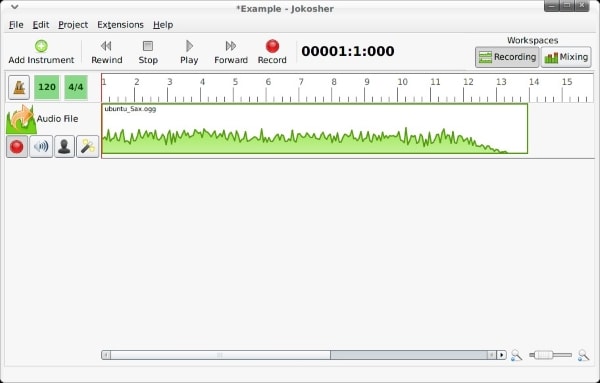
Key Features
- A simple and easy-to-use interface.
- Support for extended audio file formats including MP3, OGG, FLAC, WAV, etc.
- Multi-track overlayed audio mixing and editing support.
- Add instrumentals to your audios, including bass guitars, saxophone, trumpets, and more.
- An Extensions menu for extra features such as managing instruments and setting the tempo.
Conclusion
Finding the right tool for your every need is not always an easy task. But with the correct guidance, you can select the appropriate tool based on your needs.
The above-mentioned tools can make your audio files flourish in the best way possible. You can trim, merge, delete, or split audio files in a few simple clicks. You can also use these open-source sound editor tools to change playback speed and other properties. You can now put your creative abilities to good use. There’s so much that you can do!
If you wish to work with video files, your go-to video editor should undoubtedly be Wondershare Filmora . This one-of-a-kind editor allows you to make and edit quality video content in a stress-free way. Filmora is certainly every content creator’s first choice when it comes to top video editing software. You won’t be disappointed with the results!
For Win 7 or later (64-bit)
For macOS 10.12 or later
2. WaveShop
WaveShop is yet another excellent open-source sound editor that can get the job done. It is a free and simple audio editor that is perfect for Windows users. WaveShop also comes in portable packages to suit your various needs. Do you wish to know more about it?
WaveShop offers many useful features for audio editing. You can import your audio files into the program’s interface and can then apply a range of functions. From trimming to amplifying and reversing audios, WaveShop lets you do it all. Go through its features to know more about it.

Key Features
- A multi-tab interface that enables you to edit different soundtracks in different windows.
- A timeline to easily delete, insert, or edit audio tracks.
- Audio effects and filters such as fade, reverse, amplify, etc.
- Save your output file in several formats such as RAW, WAV, AVR, FLAC, etc.
- A range of customization options like changing the sample size and waveform etc.
3. SoundEditor
The next open-source audio editor on our list is SoundEditor. Like other audio editors, SoundEditor comes with a range of editing options. These include cut/copy functions and recording soundtracks. The editor can also support multiple file editing in as many windows as you want. Isn’t it great?
Although SoundEditor comes with a full set of editing tools, it only supports WAV file formats. Still, the software is a good choice with its thorough toolset and easy-to-use functions. You can look across the key features to be sure about your selection.

Key Features
- A built-in sound recorder in the software.
- Options to insert silence at specified lengths in the audio.
- Change the playback speed of the entire track or specific sections.
- Wave synthesizer and resampler options for audio files.
- A multiple documents interface to let you open many windows at once.
4. Ardour
Another splendid open-source sound editor specifically meant for Windows users is Ardour. Musicians, audio engineers, soundtrack editors, and composers worldwide trust Ardour. Ardour offers a set of comprehensive audio editing tools which can be used to make your audios shine. This is truly phenomenal!
Despite its unique features, Ardour is still pretty easy to use. Anyone with a basic idea about editing can use it to create audio masterpieces. From multichannel tracks to mixing and panning, Ardour has it all. Look across these features to know why it is among the best!

Key Features
- No limit to the number of tracks that can be edited simultaneously.
- Multichannel file export to save output files in different formats and sample rates.
- Flexible recording style without any setup requirement.
- Import videos and extract audio from them.
- Multiple routing and panning options along with sample-accurate automation.
5. Jokosher
Looking for a beginner-friendly tool? The answer lies in Jokosher. Jokosher is a simple and easy open-source audio editing software. As opposed to other complicated editors, Jokosher offers a plain and user-friendly interface. For people who do not have much experience in the field, Jokosher is the perfect fit.
You can use the tool to create powerful soundtracks for music, podcasts, and more. The timeline in Jokosher’s interface is relatively simple. You can achieve all basic aspects of audio editing, including audio mixing and splitting. Why is this option great? The features below say it all!

Key Features
- A simple and easy-to-use interface.
- Support for extended audio file formats including MP3, OGG, FLAC, WAV, etc.
- Multi-track overlayed audio mixing and editing support.
- Add instrumentals to your audios, including bass guitars, saxophone, trumpets, and more.
- An Extensions menu for extra features such as managing instruments and setting the tempo.
Conclusion
Finding the right tool for your every need is not always an easy task. But with the correct guidance, you can select the appropriate tool based on your needs.
The above-mentioned tools can make your audio files flourish in the best way possible. You can trim, merge, delete, or split audio files in a few simple clicks. You can also use these open-source sound editor tools to change playback speed and other properties. You can now put your creative abilities to good use. There’s so much that you can do!
If you wish to work with video files, your go-to video editor should undoubtedly be Wondershare Filmora . This one-of-a-kind editor allows you to make and edit quality video content in a stress-free way. Filmora is certainly every content creator’s first choice when it comes to top video editing software. You won’t be disappointed with the results!
For Win 7 or later (64-bit)
For macOS 10.12 or later
2. WaveShop
WaveShop is yet another excellent open-source sound editor that can get the job done. It is a free and simple audio editor that is perfect for Windows users. WaveShop also comes in portable packages to suit your various needs. Do you wish to know more about it?
WaveShop offers many useful features for audio editing. You can import your audio files into the program’s interface and can then apply a range of functions. From trimming to amplifying and reversing audios, WaveShop lets you do it all. Go through its features to know more about it.

Key Features
- A multi-tab interface that enables you to edit different soundtracks in different windows.
- A timeline to easily delete, insert, or edit audio tracks.
- Audio effects and filters such as fade, reverse, amplify, etc.
- Save your output file in several formats such as RAW, WAV, AVR, FLAC, etc.
- A range of customization options like changing the sample size and waveform etc.
3. SoundEditor
The next open-source audio editor on our list is SoundEditor. Like other audio editors, SoundEditor comes with a range of editing options. These include cut/copy functions and recording soundtracks. The editor can also support multiple file editing in as many windows as you want. Isn’t it great?
Although SoundEditor comes with a full set of editing tools, it only supports WAV file formats. Still, the software is a good choice with its thorough toolset and easy-to-use functions. You can look across the key features to be sure about your selection.

Key Features
- A built-in sound recorder in the software.
- Options to insert silence at specified lengths in the audio.
- Change the playback speed of the entire track or specific sections.
- Wave synthesizer and resampler options for audio files.
- A multiple documents interface to let you open many windows at once.
4. Ardour
Another splendid open-source sound editor specifically meant for Windows users is Ardour. Musicians, audio engineers, soundtrack editors, and composers worldwide trust Ardour. Ardour offers a set of comprehensive audio editing tools which can be used to make your audios shine. This is truly phenomenal!
Despite its unique features, Ardour is still pretty easy to use. Anyone with a basic idea about editing can use it to create audio masterpieces. From multichannel tracks to mixing and panning, Ardour has it all. Look across these features to know why it is among the best!

Key Features
- No limit to the number of tracks that can be edited simultaneously.
- Multichannel file export to save output files in different formats and sample rates.
- Flexible recording style without any setup requirement.
- Import videos and extract audio from them.
- Multiple routing and panning options along with sample-accurate automation.
5. Jokosher
Looking for a beginner-friendly tool? The answer lies in Jokosher. Jokosher is a simple and easy open-source audio editing software. As opposed to other complicated editors, Jokosher offers a plain and user-friendly interface. For people who do not have much experience in the field, Jokosher is the perfect fit.
You can use the tool to create powerful soundtracks for music, podcasts, and more. The timeline in Jokosher’s interface is relatively simple. You can achieve all basic aspects of audio editing, including audio mixing and splitting. Why is this option great? The features below say it all!

Key Features
- A simple and easy-to-use interface.
- Support for extended audio file formats including MP3, OGG, FLAC, WAV, etc.
- Multi-track overlayed audio mixing and editing support.
- Add instrumentals to your audios, including bass guitars, saxophone, trumpets, and more.
- An Extensions menu for extra features such as managing instruments and setting the tempo.
Conclusion
Finding the right tool for your every need is not always an easy task. But with the correct guidance, you can select the appropriate tool based on your needs.
The above-mentioned tools can make your audio files flourish in the best way possible. You can trim, merge, delete, or split audio files in a few simple clicks. You can also use these open-source sound editor tools to change playback speed and other properties. You can now put your creative abilities to good use. There’s so much that you can do!
If you wish to work with video files, your go-to video editor should undoubtedly be Wondershare Filmora . This one-of-a-kind editor allows you to make and edit quality video content in a stress-free way. Filmora is certainly every content creator’s first choice when it comes to top video editing software. You won’t be disappointed with the results!
For Win 7 or later (64-bit)
For macOS 10.12 or later
2. WaveShop
WaveShop is yet another excellent open-source sound editor that can get the job done. It is a free and simple audio editor that is perfect for Windows users. WaveShop also comes in portable packages to suit your various needs. Do you wish to know more about it?
WaveShop offers many useful features for audio editing. You can import your audio files into the program’s interface and can then apply a range of functions. From trimming to amplifying and reversing audios, WaveShop lets you do it all. Go through its features to know more about it.

Key Features
- A multi-tab interface that enables you to edit different soundtracks in different windows.
- A timeline to easily delete, insert, or edit audio tracks.
- Audio effects and filters such as fade, reverse, amplify, etc.
- Save your output file in several formats such as RAW, WAV, AVR, FLAC, etc.
- A range of customization options like changing the sample size and waveform etc.
3. SoundEditor
The next open-source audio editor on our list is SoundEditor. Like other audio editors, SoundEditor comes with a range of editing options. These include cut/copy functions and recording soundtracks. The editor can also support multiple file editing in as many windows as you want. Isn’t it great?
Although SoundEditor comes with a full set of editing tools, it only supports WAV file formats. Still, the software is a good choice with its thorough toolset and easy-to-use functions. You can look across the key features to be sure about your selection.

Key Features
- A built-in sound recorder in the software.
- Options to insert silence at specified lengths in the audio.
- Change the playback speed of the entire track or specific sections.
- Wave synthesizer and resampler options for audio files.
- A multiple documents interface to let you open many windows at once.
4. Ardour
Another splendid open-source sound editor specifically meant for Windows users is Ardour. Musicians, audio engineers, soundtrack editors, and composers worldwide trust Ardour. Ardour offers a set of comprehensive audio editing tools which can be used to make your audios shine. This is truly phenomenal!
Despite its unique features, Ardour is still pretty easy to use. Anyone with a basic idea about editing can use it to create audio masterpieces. From multichannel tracks to mixing and panning, Ardour has it all. Look across these features to know why it is among the best!

Key Features
- No limit to the number of tracks that can be edited simultaneously.
- Multichannel file export to save output files in different formats and sample rates.
- Flexible recording style without any setup requirement.
- Import videos and extract audio from them.
- Multiple routing and panning options along with sample-accurate automation.
5. Jokosher
Looking for a beginner-friendly tool? The answer lies in Jokosher. Jokosher is a simple and easy open-source audio editing software. As opposed to other complicated editors, Jokosher offers a plain and user-friendly interface. For people who do not have much experience in the field, Jokosher is the perfect fit.
You can use the tool to create powerful soundtracks for music, podcasts, and more. The timeline in Jokosher’s interface is relatively simple. You can achieve all basic aspects of audio editing, including audio mixing and splitting. Why is this option great? The features below say it all!

Key Features
- A simple and easy-to-use interface.
- Support for extended audio file formats including MP3, OGG, FLAC, WAV, etc.
- Multi-track overlayed audio mixing and editing support.
- Add instrumentals to your audios, including bass guitars, saxophone, trumpets, and more.
- An Extensions menu for extra features such as managing instruments and setting the tempo.
Conclusion
Finding the right tool for your every need is not always an easy task. But with the correct guidance, you can select the appropriate tool based on your needs.
The above-mentioned tools can make your audio files flourish in the best way possible. You can trim, merge, delete, or split audio files in a few simple clicks. You can also use these open-source sound editor tools to change playback speed and other properties. You can now put your creative abilities to good use. There’s so much that you can do!
If you wish to work with video files, your go-to video editor should undoubtedly be Wondershare Filmora . This one-of-a-kind editor allows you to make and edit quality video content in a stress-free way. Filmora is certainly every content creator’s first choice when it comes to top video editing software. You won’t be disappointed with the results!
For Win 7 or later (64-bit)
For macOS 10.12 or later
Also read:
- [New] 21+ Novel Collage Formulas Amplify Your Mood
- [Updated] 2024 Approved Stream and Save A Guide to Xbox Broadcasting
- [Updated] Resolve Twitter Vids Playback Issue
- 2024 Approved Navigating Screen Space Enlargement on YouTube
- Audio Implementation in AVI-2023 Formats A Step-by-Step Manual
- In 2024, How to Come up With the Best Pokemon Team On Honor Magic5 Ultimate? | Dr.fone
- New 2024 Approved Perfecting Soft Audio Edges A Guide to Smooth Transitioning in iMovie
- New Elevate Your Editing Game Learning to Disconnect Video and Sound in iMovie (macOS Edition) for 2024
- New In 2024, The Audio Experts Manual to Identifying Superior Sound Formats
- New In 2024, The Easy-Path to Crafting Your Audio Book A Detailed Tutorial
- New Voice Modification & Removal Techniques The Best Software Solutions for Karaoke & Music Production
- The AI Music Forerunners Crafting Harmonies for a New Era
- The Easiest Methods to Hard Reset Xiaomi Redmi K70 | Dr.fone
- Top IMEI Unlokers for Apple iPhone 7 and Android Phones
- Troubleshooting Guide: Fixing The King of Fighters XV's Persistent PC Crashes
- Title: Updated Swift Solutions for Auditory Clarity Banishing Buildup Noise
- Author: David
- Created at : 2024-10-10 20:10:17
- Updated at : 2024-10-11 16:38:37
- Link: https://sound-tweaking.techidaily.com/updated-swift-solutions-for-auditory-clarity-banishing-buildup-noise/
- License: This work is licensed under CC BY-NC-SA 4.0.